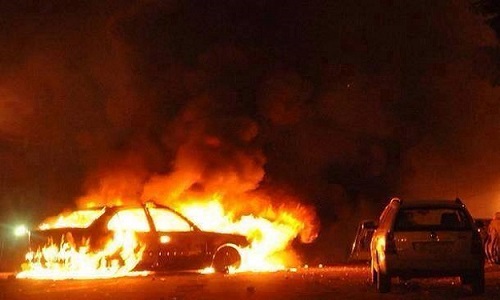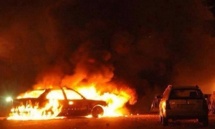Ahmed Abu Khatallah is now en route to the United States, where he could face the death penalty, officials said Tuesday.
The raid represented a victory for President Barack Obama, who has faced intense criticism over his administration's handling of the September 11, 2012 Benghazi assault and its aftermath.
Four Americans including US ambassador Christopher Stevens were killed when gunmen stormed the US consulate and set it on fire, and a CIA outpost was also targeted.
"The United States has an unwavering commitment to bring to justice those responsible for harming Americans," Obama said.
"Since the deadly attacks on our facilities in Benghazi, I have made it a priority to find and bring to justice those responsible for the deaths of four brave Americans."
Attorney General Eric Holder said the raid showed "our nation's memory is long and our reach is far."
There were no civilian or other casualties in Sunday's raid and US troops taking part in the operation have "safely departed Libya," Pentagon spokesman Rear Admiral John Kirby said.
Kirby would not say whether Washington gave advance notice to Tripoli.
He said it was a "unilateral" action without any Libyan forces involved but declined to offer more details of the operation, including whether any shots were fired.
The suspect was being held temporarily on a naval ship, as in similar raids in the past, according to defense officials, who spoke on condition of anonymity.
Top US diplomat John Kerry called the raid a "bold action" that served as a reminder that there was no "impunity" for militants trying to harm America.
- Political issue -
The Benghazi attack shocked Washington and became a highly charged political issue, raising questions about security at US missions. Former secretary of state Hillary Clinton faced hostile questioning before lawmakers over the issue.
Republicans alleged that the White House failed to respond decisively and then tried to hide some facts in the grisly episode.
The Obama administration has accused critics of politicizing a tragic event and says that it has divulged all the details of the case.
US federal prosecutors have charged Khatallah with murder, carrying a weapon and offering material support to "terrorism," according to an indictment. The first charge potentially carries the death penalty.
The charges reflect accounts from Libyan officials and witnesses who have singled out Khatallah as allegedly taking part in the assault that day.
Khatallah has been seen in public often and gave an interview to The New York Times last year, striking a defiant tone over a strawberry frappe at a cafe in a luxury hotel in Benghazi.
But US officials dismissed suggestions that the suspect was "hiding in plain sight" or that the operation could have been conducted much sooner.
- No Guantanamo -
The State Department had identified Khatallah as a senior leader of Ansar al-Sharia, a Libyan Islamist group it brands a "terrorist" organization responsible for a spate of attacks and assassinations.
Some critics have already blasted the administration for holding Khatallah at sea instead of at the US-run prison at Guantanamo Bay, Cuba, where he could be treated as an "enemy combatant" and held without trial.
But the administration plans to try him in a civilian court, where some other prominent terror suspects have been prosecuted.
In October last year, US special operations forces staged a similar raid in Tripoli, apprehending Abu Anas al-Libi, a suspect linked to the 1998 Al-Qaeda bombings of US embassies in East Africa.
He was taken to New York, where he faces federal charges over his alleged role in the bombing.
"The system has repeatedly proven that it can successfully allow us to gather intelligence, handle the threat that we continue to face, and prosecute terrorists," said National Security Council spokeswoman Caitlin Hayden.
---------------------------------------------------------------------------------------
The raid represented a victory for President Barack Obama, who has faced intense criticism over his administration's handling of the September 11, 2012 Benghazi assault and its aftermath.
Four Americans including US ambassador Christopher Stevens were killed when gunmen stormed the US consulate and set it on fire, and a CIA outpost was also targeted.
"The United States has an unwavering commitment to bring to justice those responsible for harming Americans," Obama said.
"Since the deadly attacks on our facilities in Benghazi, I have made it a priority to find and bring to justice those responsible for the deaths of four brave Americans."
Attorney General Eric Holder said the raid showed "our nation's memory is long and our reach is far."
There were no civilian or other casualties in Sunday's raid and US troops taking part in the operation have "safely departed Libya," Pentagon spokesman Rear Admiral John Kirby said.
Kirby would not say whether Washington gave advance notice to Tripoli.
He said it was a "unilateral" action without any Libyan forces involved but declined to offer more details of the operation, including whether any shots were fired.
The suspect was being held temporarily on a naval ship, as in similar raids in the past, according to defense officials, who spoke on condition of anonymity.
Top US diplomat John Kerry called the raid a "bold action" that served as a reminder that there was no "impunity" for militants trying to harm America.
- Political issue -
The Benghazi attack shocked Washington and became a highly charged political issue, raising questions about security at US missions. Former secretary of state Hillary Clinton faced hostile questioning before lawmakers over the issue.
Republicans alleged that the White House failed to respond decisively and then tried to hide some facts in the grisly episode.
The Obama administration has accused critics of politicizing a tragic event and says that it has divulged all the details of the case.
US federal prosecutors have charged Khatallah with murder, carrying a weapon and offering material support to "terrorism," according to an indictment. The first charge potentially carries the death penalty.
The charges reflect accounts from Libyan officials and witnesses who have singled out Khatallah as allegedly taking part in the assault that day.
Khatallah has been seen in public often and gave an interview to The New York Times last year, striking a defiant tone over a strawberry frappe at a cafe in a luxury hotel in Benghazi.
But US officials dismissed suggestions that the suspect was "hiding in plain sight" or that the operation could have been conducted much sooner.
- No Guantanamo -
The State Department had identified Khatallah as a senior leader of Ansar al-Sharia, a Libyan Islamist group it brands a "terrorist" organization responsible for a spate of attacks and assassinations.
Some critics have already blasted the administration for holding Khatallah at sea instead of at the US-run prison at Guantanamo Bay, Cuba, where he could be treated as an "enemy combatant" and held without trial.
But the administration plans to try him in a civilian court, where some other prominent terror suspects have been prosecuted.
In October last year, US special operations forces staged a similar raid in Tripoli, apprehending Abu Anas al-Libi, a suspect linked to the 1998 Al-Qaeda bombings of US embassies in East Africa.
He was taken to New York, where he faces federal charges over his alleged role in the bombing.
"The system has repeatedly proven that it can successfully allow us to gather intelligence, handle the threat that we continue to face, and prosecute terrorists," said National Security Council spokeswoman Caitlin Hayden.
---------------------------------------------------------------------------------------









 Home
Home Politics
Politics











